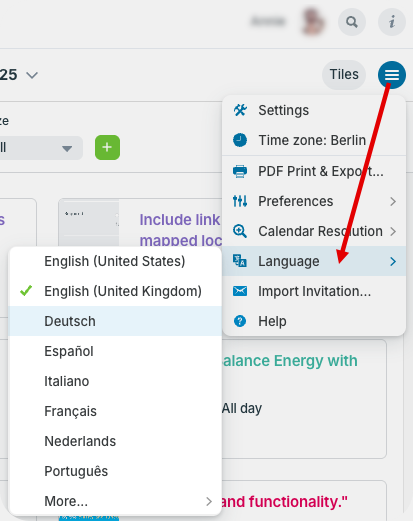
Teamup Ticker
How to use the same calendar with different preferred languages
Teamup is currently available in multiple languages, including Simplified and Traditional Chinese. Calendar administrators can set one default language for the calendar, but what if users have different preferred languages?
For example:
-
Global teams: A company with offices in Germany, China, and the U.S. shares the same Teamup calendar.
-
International events and conferences: Event organizers publish a public Teamup calendar for attendees worldwide.
-
Education and training: Universities or training providers working with international students.
-
Customer-facing shared calendars: A business such as a fitness studio or coworking space shares its calendar with multilingual customers.
That's no problem. All calendar users can change the language when using Teamup to work in their preferred language.
Everyone works with the same calendar structure, but in the language that makes sense to them.
Note that this language setting applies to the language shown on the Teamup software interface such as headers, menu options, buttons, etc. Calendar content (event information added by users) will not be translated. You can add the information for an event (title, description, etc.) in any language when using the event editor.
In a browser

From the calendar menu:
- Click the blue menu (top right).
- Select Language.
- Click More to see the full list of available languages.
- Click on the language you wish to use.
With a link parameter:
Calendar link parameters are key=value pairs that are appended at the end of a calendar URL. When you add a link parameter, it forces the calendar to load according to the value of that parameter. The link parameters will override the default settings but only for the link with the parameters added.
- Append the lang=[LL] link parameter to your calendar link. Replace the [LL] with the language code for your preferred language: en for English, de for German, es for Spanish, etc. See a list here.
You can bookmark the calendar link with the parameter added for quick access.
In the Teamup app
The language used in the Teamup app (iOS, Android) is controlled by the default language in your device's settings. If you change the language setting on your device, the Teamup app will automatically adjust. If your device language is not among Teamup’s supported languages, English will be used in the app. More info.